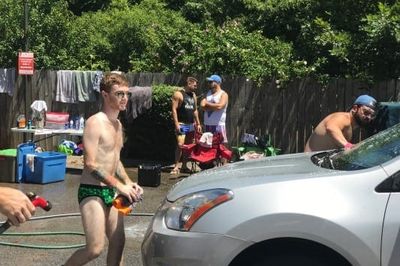In the wake of the tragic shooting at a Knoxville church, many GLBT community members are weighing in on whether the attack should be considered a hate crime against gays.
Knoxville Police charged Jim D. Adkisson, 58, with one count of first degree murder after he shot and killed two people and wounded seven others with a shotgun at the Tennessee Valley Unitarian Universalist Church in Knoxville on Sunday, July 26.
Knoxville Police Chief Sterling P. Owen IV told reporters at a press conference that a four page letter written by the shooter indicated the attack was over the shooter's "lack of being able to obtain a job and frustration over that and his stated hatred for the liberal movement."
A reporter asked the police chief “does that mean he was talking about targeting gays in particular or just liberals in general?”
“Both,” the chief responded. “Liberals in general, as well as gays.”
Police have not released more information about the letter or its contents.
Some leaders, such as Tennessee Equality President Chris Sanders, say the incident demonstrates a great need for tougher laws about hate crimes in Tennessee.
But Todd Cramer, a leader with the Knoxville Human Rights Group (not associated with the national Human Rights Campaign), worries that specifying the crime as an attack on gays might be like crying wolf.
"This attack was against liberals which includes a lot of subsets of people, not just gays," Cramer said. "If you term an incident as a hate crime when it isn't, in other cases you won't have the support or the outcry that you need when the crime is targeted at a more specific group."
Gary Elgin, Knoxville gay activist, reached out to Knoxville mayor Bill Haslam in a letter, released by the Knoxville News Sentinel, asking for an increased amount of support for the GLBT community as well as the greater Knoxville community.
"This is the time for you to actually and sincerely stand by us, as well as this tragedy's victims, their families and all the citizens of Knoxville who value basic human rights and liberties," Elgin said in the letter. "Let our community and the greater Knoxville community know that the GLBT community is valued and should not continue to be a target for hate and violence."
The mayor responded in a letter to Elgin saying, "It is often easy to make these tragic events, which are far too frequent, about the community in which they occur. Knoxville is a caring, compassionate city where diverse viewpoints are shared and respected. Every person, regardless of race, religion, age, sex, or sexual orientation is a person of human dignity and a valued member of our community."
Elgin said the mayor's response was a positive step toward building a working relationship between the GLBT community and local government.
Cramer said Elgin's letter demonstrated how this incident could be used to emphasize the importance of advancing GLBT issues without calling for specific hate-crimes legislation.
"People are going to be less perceptive if they feel like we're taking advantage of situations that don't really involve only the GLBT community," Cramer said. "I do think, however... the mayor should call for the City Council to re-look at the Human Rights Resolution that they passed in the fall of 2005."
